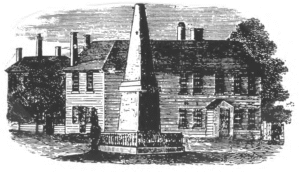By S. M. “Sudi” Smoller | Five Minute Read

Like most of their Essex County neighbors, locals boycotted the drinking of tea after the English Stamp Act of 1763. In the farming part of Danvers, the women outwitted the law by serving tea on the roof of the Page home – a reenactment of which
was held on May 17th for the 250th Revolution anniversary commemorations. The women from the manufacturing side of Danvers to the south (now Peabody) were also clever in their patriotism, while still drinking tea on the sly. I doubt folks today would want to taste the offering our lady ancestors unknowingly served and drank.
The tale is captured beautifully by Fitch Poole (1803-1873). He was a local boy who grew up a friend of George Peabody and went on to be the Peabody Institute’s Librarian as well as Editor of the weekly South Danvers Wizard newspaper (1859-1865). He was also local entertainment – playing April Fool’s jokes and writing many tales of local lore. One of his best is “The Old Bell Tavern” – the gathering spot on Washington Street that held much of our local history. The setting for the tale was the town’s common gathering spot, “an ancient building” that was being demolished in 1840 when this story appeared. The Bell Tavern’s signboard read “Entertainment for Man and Beast.” This was also the place where the people of that – and later – times met to celebrate public events.
At the time of the odious Stamp Act, all Parliament taxes on the colonists were patriotically denounced.
“Tea was proscribed and its sale forbidden, under penalty of a ride on a rail and the brand of toryism. One conviction only took place, and the unlucky wight obtained a reprieve from his sentence, by furnishing the villagers with a bucket of punch. His neighbors kindly gave him a share of the beverage, obliging him to repeat over his cup, three times, the following elegant couplet :
I, Isaac Wilson, a tory I be;
I, Isaac Wilson, I sell tea.
“But our ancestors, however, willing from patriotic considerations to deny themselves this luxury, found great difficulty in preventing the gentler sex from partaking the forbidden fruit. They found means to procure and opportunities to prepare their favorite nectar, in spite of all the vigilance of the men. They would evade every searching operation, get up quiltings and other parties, where it was not expected men would be present, and sip their stolen sweets in secret.

“It was well known at the tap court of the Bell Tavern that these proceedings were going on, and it was strongly suspected that a certain enormous coffee pot, a few sizes smaller than a common light-house, had some agency in the business, as it was always seen migrating from place to place where the good dames held their meetings. One evening a large party assembled at the house of one of their number; taking advantage of the well-known habits of the master of the house, who was never known to quit his seat at the ample fireplace of the inn, until all his companions had departed, they resolved to enjoy their usual feast in security.
“The great coffee pot, in which the tea had been previously put, was brought forward, the water added, and the whole left to simmer on the hearth. The savory mess was now poured out, with many a sly joke at the expense of the men in general, and a compliment to Isaac in particular. Many were the encomiums on the superiority of the tea, which everyone declared was the best she had ever drank. It was finally thought that its strength and flavor were owing to its having been boiled and steeped longer than usual. Its extraordinary richness was almost intoxicating; tongues were loosened and mirth and hilarity prevailed. Their wits ran out and so did the tea. More water was added to the leaves and a weaker decoction was drawn, until again the vessel was empty. A third time the water was poured in and the tea ran out.
“The time had now nearly arrived when by possibility the good man of the house might be expected home, and it was time to put the grounds into the coffee pot, for a place of burial must be made in the tan back of the fireplace for the remains of the tea. The lid was removed, and with a mysterious jerk the contents, consisting not of tea leaves but a huge overgrown toad, speckled and bloated, lay sprawling before them on the hearth! A simultaneous scream from twenty female voices, accompanied by the heaving of as many stomachs, announced the appalling discovery, and sufficiently explained the cause of the peculiar richness of their beverage. It is said that the discovery accomplished the effects that are said to have been produced by Chambers’ medicine on another class of drinkers, and that for some time after, tea was less in demand than it was ever before known in the village.”

Sources:
“The Old Bell Tavern” by Fitch Poole. Reprinted in the South Danvers Wizard, April 13, 1864, pg. 1.
The Historical Collections of the Danvers Historical Society, Volume 17, page 9 – Originally published as an article written in 1840 for the Salem Gazette
